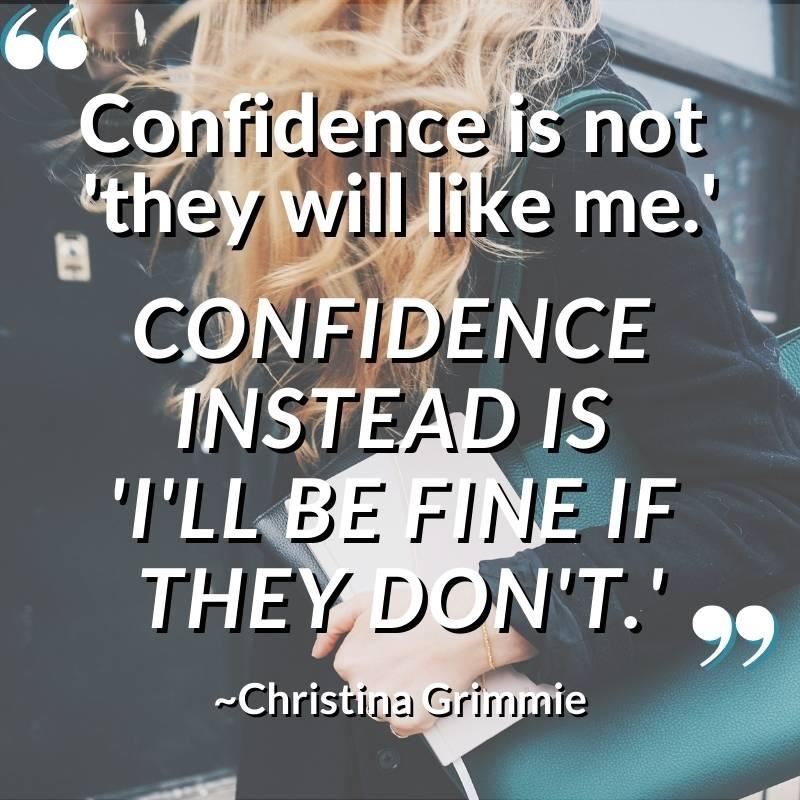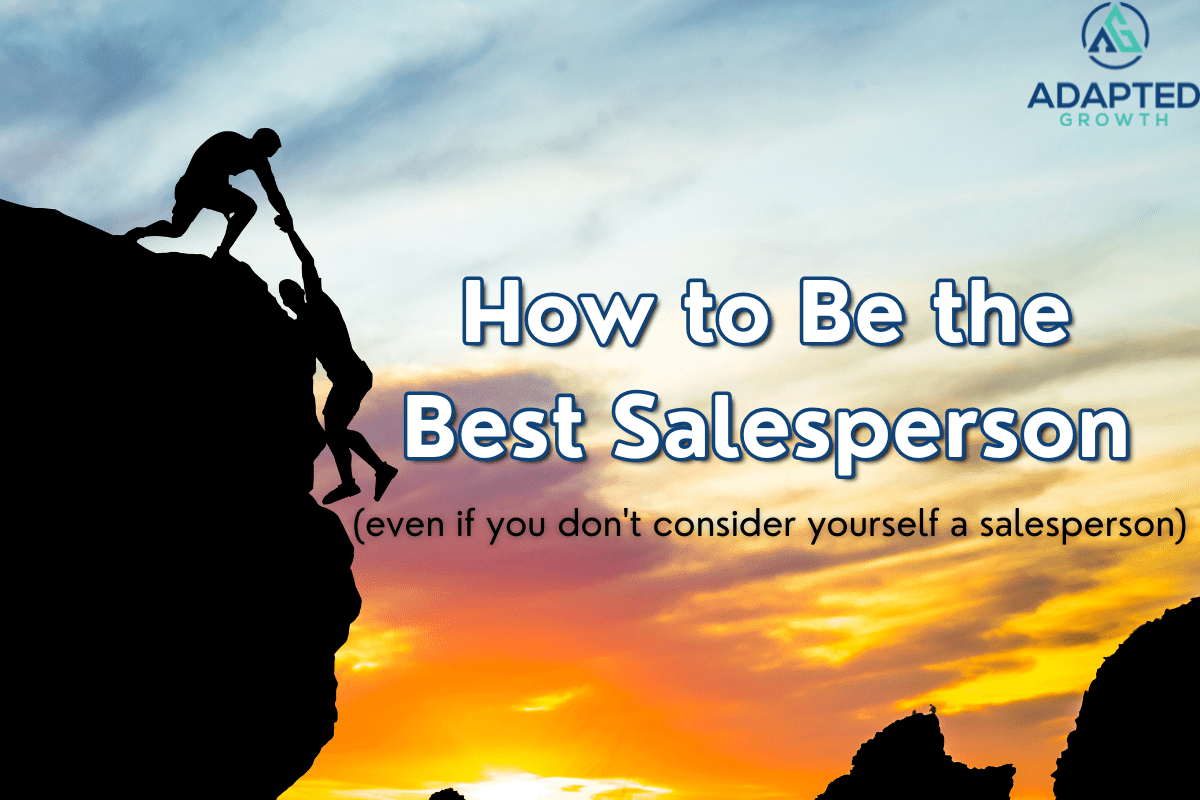
Full disclosure: I struggled with confidence in sales for a long time, though I didn’t realize it for a while. And usually, I’m not a fan of taking life advice from a single quote. But every once in a while, you see one that is actually impactful. For me, this one hit home, especially in how I think about confident selling today:

Seeing this for the first time made my jaw drop for a couple of reasons.
- Where was this when I was 14 and wishing I was as popular and confident as my friends?
- This is what most people are missing when they think about sales.
Building confidence in teenagers is not in my wheelhouse, so I’ll leave that to the experts. But confidence in sales is something I know a lot about. Well, I do now.
When You Don’t Have Confidence in Sales
Most salespeople gain confidence over time if they do it long enough and see enough success. But how long does that take, and what’s “enough success?” What about when you’re brand new and haven’t had time to cross those imaginary lines yet?
Or what if you’re not a traditional salesperson? Maybe you’re an entrepreneur who isn’t ready to hire a sales team. If you don’t have any sales experience, you might not feel comfortable selling your service to people—even though you know you have to in order to stay in business.
The inexperienced or unsure salesperson (my previous self included) all do these same things:
- Tries to pitch services to everyone who will listen
- Feels crushed when people don’t want to talk to you
- Constantly chases and “checks in” with leads, hoping they’ll finally say ‘yes’
- Feels like a pest or too ‘salesy’
For entrepreneurs who sell their products themselves, they might just avoid those conversations as much as possible.
Once you turn the corner, though, these things naturally go away. You build a level of confidence that removes the need to be pushy, chase people down to beg for their business, or avoid sales conversations altogether.
How Confidence in Sales Helps You Build a Better Client Base
Your confidence gives you so much more freedom in your sales role.
This is especially important when you own or work in a small business because you don’t have access to the same resources that big companies have. So if you lack confidence, you’ll almost kill yourself trying to make every conversation work or every deal close.
You’ll end up taking on unqualified clients who aren’t happy with you and vice versa. Or, you’ll stretch yourself too thin by doing everything for every client so that they stay. You’ll be miserable, and the pressure never stops.
It’s like playing every hand in poker, good and bad, and being mad when you’ve lost tons of money at the end of the night.
You should’ve folded more hands. And you could probably turn away more clients.
There are 7.8 billion people on the planet. How many of them do you need to close to make the money you want to make? If the answer is anything less than “all of them,” then you can stop trying to close everyone you talk to.
Where Are Your Priorities?
Confidence in sales means allowing “no” in your conversations from both sides.
When you’re confident about your ability to do your job well and close enough deals to hit your goals, you can prioritize the right things.
Many unsure salespeople end up prioritizing the prospect, not their current clients or team. So they close unfit clients, which ends up hurting everybody.
Newer entrepreneurs are particularly prone to this danger. It’s hard enough to split your time between everything you need to do. But because you’re trying to run a growing business, it’s virtually impossible to say no to money — even if that money comes from somebody who will make your life harder.
Think about your sales team
It’s not just your life, though. Those unqualified, poorly fitting clients will run off good team members that are tired of dealing with them. And trust me, learning how to hire good salespeople is a lot harder than closing deals!
However, the confident salesperson or entrepreneur will ask the right questions to ensure that every prospect is a good fit before advancing the conversation. That self-assuredness allows them to ask more challenging questions that more timid salespeople try to avoid because they don’t want to be “unlikeable.”
Having Confidence in Sales Means Not Needing to be Liked
It’s true. You don’t have to be liked by every client that buys from you. As a matter of fact, you don’t have to be liked by everybody in general. That’s a scary thought for some, but overcoming that fear will help you in every possible respect.
Confident salespeople understand that:
- They’re not going to please everybody.
- Setting your standards is an important aspect of a healthy mind and business.
- Stating your standards and turning people down isn’t going to diminish your likability. If they’re mad about it, that’s on them.
I was coaching a closer who had recently had a rough sales conversation. He was trying to convince a prospect to look at a demo. This closer thought the demo would show their prospect that they weren’t a good fit without him having to tell them.
So I asked, “Why didn’t you just tell them you couldn’t help them?” He said that he felt uncomfortable saying they weren’t a good fit because it would hurt his “likability quotient.”
This is where the I’s in the DISC spectrum struggle.
Then I asked, “Would you prefer the prospect to like you, or do you want your boss and team to like you?”
He admitted, “My boss and team.” That’s when he realized his mistake. Bringing on a painful or exhausting client would hurt his likability quotient with the people who really matter a lot more than one prospect who he’d probably never talk to again.
How Unqualified Clients Hurt Businesses
Here’s what could have happened if he didn’t realize this.
- He sends over the demo, and the prospect is still convinced it’s a good choice for them.
- This small company takes on a client who expects things they cannot do.
- Over time, more resources are dedicated to this one client than those who were better qualified.
- The team is angry; some of them even quit.
- Eventually, this client’s needs and expectations are unmet, and they end up angry and leave anyway.
Do you see the trail of horror left by one unqualified client?
It’s all avoidable when you gain the ability and confidence in sales to ask the right questions and say no when you don’t think it’s a good fit.
How to Have It Even When You Don’t
While that level of competent confidence doesn’t happen overnight, there is a way to fake it until it does happen. It’s called process.
You build these questions into your process and practice asking them until they no longer feel wrong. The more times you say something, even to another salesperson in a role-play situation, the more natural and comfortable it feels.
It’s just like building up any other muscle. It sucks, and it’s hard at first, but eventually, you’ll learn to say, “I’m not sure that we’re a good fit for you,” without being scared of their reaction.
Your confidence in sales will lead to a stronger business and a happier working environment for you and everybody who works with you. It’ll give you a better idea of how to price your products. You’ll be able to set firmer expectations with prospects that will lead to less chasing. And your clients will have more faith in your knowledge and intentions because confidence leads to trust.
Building a healthy confidence level takes time, but it’ll help you in every aspect of your role.
Are you ready to level up your confidence in sales and close more qualified clients?









